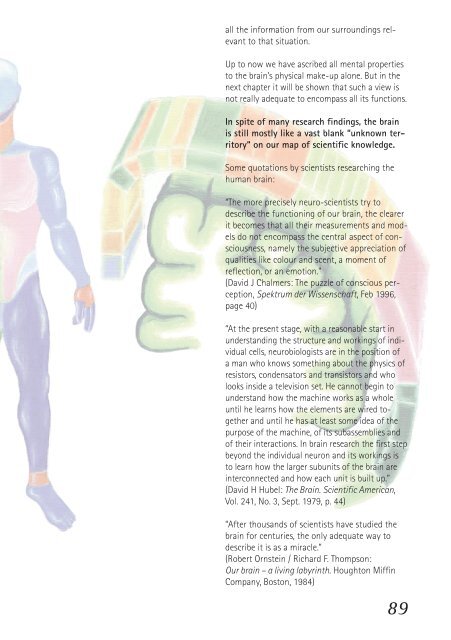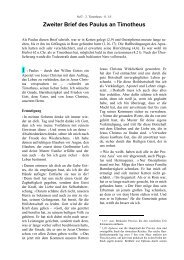You also want an ePaper? Increase the reach of your titles
YUMPU automatically turns print PDFs into web optimized ePapers that Google loves.
all the information from our surroundings relevant<br />
to that situation.<br />
Up to now we have ascribed all mental properties<br />
to the brain’s physical make-up alone. But in the<br />
next chapter it will be shown that such a view is<br />
not really adequate to encompass all its functions.<br />
In spite of many research findings, the brain<br />
is still mostly like a vast blank “unknown territory“<br />
on our map of scientific knowledge.<br />
Some quotations by scientists researching the<br />
human brain:<br />
“The more precisely neuro-scientists try to<br />
describe the functioning of our brain, the clearer<br />
it becomes that all their measurements and models<br />
do not encompass the central aspect of consciousness,<br />
namely the subjective appreciation of<br />
qualities like colour and scent, a moment of<br />
reflection, or an emotion.”<br />
(David J Chalmers: The puzzle of conscious perception,<br />
Spektrum der Wissenschaft, Feb 1996,<br />
page 40)<br />
“At the present stage, with a reasonable start in<br />
understanding the structure and workings of individual<br />
cells, neurobiologists are in the position of<br />
a man who knows something about the physics of<br />
resistors, condensators and transistors and who<br />
looks inside a television set. He cannot begin to<br />
understand how the machine works as a whole<br />
until he learns how the elements are wired together<br />
and until he has at least some idea of the<br />
purpose of the machine, of its subassemblies and<br />
of their interactions. In brain research the first step<br />
beyond the individual neuron and its workings is<br />
to learn how the larger subunits of the brain are<br />
interconnected and how each unit is built up.”<br />
(David H Hubel: The Brain. Scientific American,<br />
Vol. 241, No. 3, Sept. 1979, p. 44)<br />
“After thousands of scientists have studied the<br />
brain for centuries, the only adequate way to<br />
describe it is as a miracle.”<br />
(Robert Ornstein / Richard F. Thompson:<br />
<strong>Our</strong> brain – a living labyrinth. Houghton Miffin<br />
Company, Boston, 1984)<br />
89
















